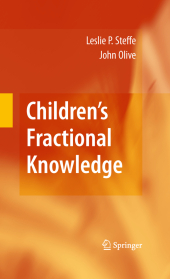 Neuerscheinungen 2014Stand: 2020-02-01 |
Schnellsuche
ISBN/Stichwort/Autor
|
Herderstraße 10
10625 Berlin
Tel.: 030 315 714 16
Fax 030 315 714 14
info@buchspektrum.de |

John Olive, Leslie Steffe
(Beteiligte)
Childrenīs Fractional Knowledge
2010. 2014. xxiii, 364 S. 235 mm
Verlag/Jahr: SPRINGER, BERLIN; SPRINGER US; SPRINGER 2014
ISBN: 1-489-98466-6 (1489984666)
Neue ISBN: 978-1-489-98466-1 (9781489984661)
Preis und Lieferzeit: Bitte klicken
In this book, the authors challenge some broadly-held assumptions about how children learn about fractions. After detailing their arguments, they then offer new research that could open the way for a dramatically improved way to teach children fractions.
Childrenīs Fractional Knowledge elegantly tracks the construction of knowledge, both by children learning new methods of reasoning and by the researchers studying their methods. The book challenges the widely held belief that childrenīs whole number knowledge is a distraction from their learning of fractions by positing that their fractional learning involves reorganizing-not simply using or building upon-their whole number knowledge. This hypothesis is explained in detail using examples of actual grade-schoolers approaching problems in fractions including the schemes they construct to relate parts to a whole, to produce a fraction as a multiple of a unit part, to transform a fraction into a commensurate fraction, or to combine two fractions multiplicatively or additively.
These case studies provide a singular journey into childrenīs mathematics experience, which often varies greatly from that of adults. Moreover, the authorsī descriptive terms reflect childrenīs quantitative operations, as opposed to adult mathematical phrases rooted in concepts that do not reflect-and which in the classroom may even suppress-youngstersī learning experiences.
Highlights of the coverage:
Toward a formulation of a mathematics of living instead of being
Operations that produce numerical counting schemes
Case studies: childrenīs part-whole, partitive, iterative, and other fraction schemes
Using the generalized number sequence to produce fraction schemes
Redefining school mathematics
This fresh perspective is of immediate importance to researchers in mathematics education. With the up-close lens onto mathematical development found in Childrenīs Fractional Knowledge , readers can work toward creating more effective methods for improving young learnersī quantitative reasoning skills.


